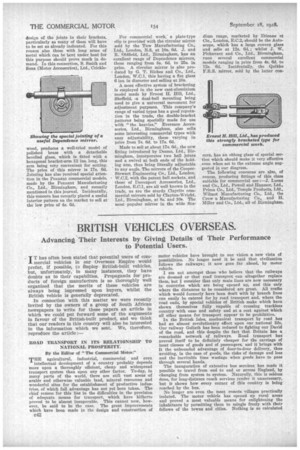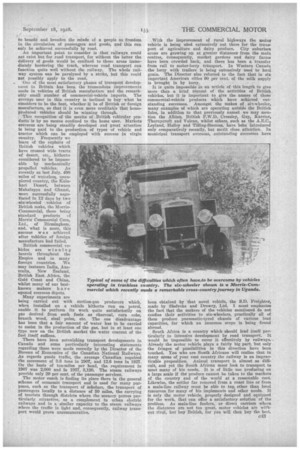BRITISH VEHICLES OVERSEAS.
Page 26

Page 27

If you've noticed an error in this article please click here to report it so we can fix it.
Advancing Their Interests by Giving Details of Their Performance to Potential Users.
T T has often been stated that potential users of coniJ1mercial vehicles in our Overseas Empire would prefer, if possible, to mploy British-built vehicles, but, unfortunately, in maoy instances, they have doubts as to their capabilties. Propaganda for products of foreign manufacture is so thoroughly well organized that the merits of these vehicles are always being impressed upon buyers, 'Whilst the British vehicle is generally deprecated.
In connection with this matter we were recently Invited by the owners of a group of South African newspapers to write for these papers an article in which we could put forward some of the arguments in favour of the British-built product, and we think that our readers in this country will also be interested in the information which we sent. We, therefore, reproduce the article:—
ROAD TRANSPORT IN ITS RELATIONSHIP TO NATIONAL PROSPERITY.
By the Editor of "The Commercial Motor."
THE agricultural, industrial, commercial and even intellectual development of a country probably depends more upon a thoroughly efficient, cheap and widespread transport system than upon any other factor. To-day, in many parts of the world, there are still vast areas of arable and otherwise valuable land, mineral resources and wonderful sites for the establishment of productive industries, of which full advantage has not yet been taken. The chief reason for this lies in the difficulties in the provision of adequate means for transport, which have hitherto proved to be almost insuperable. This cannot now, however, be said to be the case. The great improvements which have been made in the design and construction of 042 motor vehicles have brought to our vision a new vista of possibilities. No longer need it be said that civilization follows the railways; it now goes far ahead, by motor vehicle.
I am not amongst those who believe that the railways are doomed or that road transport can altogether replace them, but I consider that only main lines are now necessary in countries which are being opened up, and this only where the distances to be considered are great. All traffic which would formerly have been dealt with by branch lines can easily be catered for by road transport and, where the road ends, by special vehicles of British make which have shown themselves fully capable of crossing trackless country with ease and safety and at a cost against which all other means for transport appear to be prohibitive.
In the British Isles, mechanical transport by road has had an almost revolutionary effect upon our national life. Our railway Goliath has been reduced to fighting our David of the road, and this despite the fact that Britain has a remarkable network of railways. Road transport has proved itself to be definitely cheaper for the carriage of most classes of goods and of passengers, and it brings with It the unbounded advantage of door-to-door delivery, thus avoiding, in the case of goods, the risks of damage and loss and the inevitable time wastage when goods have to pass through several hands.
The inauguration of extensive bus services has made it possible to travel from end to end or across England, by changing from system to system. Naturally, this is seldom done, for long-distance coach services render it unnecessary, but it shows how every corner of this country is being reached by the bus.
No longer are even the most remote villages practically isolated. The motor vehicle has opened up rural areas and proved a most valuable means for enlightening the inhabitants by permitting them to mingle freely with their fellows of the towns and cities. Nothing is so calculated
to benefit and broaden the minds cf a people as freedom in the circulation of passengers and goods, and this can only be achieved successfully by road.
An important point to consider is that railways could not exist but for road transport, for without the latter the delivery of goods would be confined to those areas immediately bordering the track, whereas road transport can function quite well without the railway. The whole railway system ean be paralyzed by a strike, but this could not possibly apply to the road.
One of the most satisfactory phases of transport development in Britain has been the tremendous improvements made in vehicles of British manufacture and the remarkably small number of commercial-vehicle imports. The average user in this country is inclined to buy what he considers to be the best, whether it be of British or foreign manufacture,, so that it is even more creditable that homeProduced vehicles should be winning through.
This recognition of the merits of .British vehicular produets is by no means confined to the home user. Markets overseas are being steadily developed and great attention is being paid to the production of types of vehicle and tractor which Can be employed with success in virgin country. Frequently we
learn of the exploits of British vehicles which have crossed wide tracts of desert, etc., hitherto considered to be impassable by mechanically propelled vehicles. As recently as last July, 400 miles of waterles, unex plored country, the Kalahari Desert, between Mahalapye and Ghaozi, were successfully negotiated In 12 days by two ,six-wheeled vehicles of British make, the MorrisCommercial, these being standard products of Morris Commercial Cars, Ltd., of Birmingham, and, what is more, this success w a s achieved after vehicles of foreign manufacture had failed.
British commercial vehicles are winning laurels throughout the Empire and in many foreign countries. We may instance India, Australia, New Zealand, British East Africa, the Gold Coast and China, whilst many of our bestknown makers have opened overseas depots.
Many experiments are being carried out with suction-gas producers which, when installed on a vehicle hitherto run on petrol, enable it to perform its work quite satisfactorily on gas derived from such fuels as charcoal, corn cobs, branch wood, sisal poles, etc. The one disadvantage has been that a fair amount of water has to be carried to assist in the production cif the gas, but in at least one type now on the British market the water content of the fuel itself suffices.
There have been astonishing transport developments in Canada and some particularly interesting statements regarding these were made recently by the Director of the Bureau of Economics of the Canadian National Railways. As regards goods traffic, the average Canadian required the movement of 9.8 tons in 1907, and 12.6 tons in 1927. On the basis of ton-miles per head, the requirement in 1907 was 2,000 and in 1927, 8,120. The steam railways provide only 20 per cent, of the passenger services. The motor coach is finding its place there in the general scheme of economic transport and is used for many purposes, such as the transport of scholars the transport of
passengers locally to a distance of 50 scholars, the carrying of tourists through districts where the scenery proves partieularly attractive, as a complement to urban electric railways and in a .similar capacity to the steam railways where the traffic is light and, consequently, railway transport would prove unremunerative. With the improvement of rural highways the motor vehicle is being uged extensively out there for the transport of agriculture and dairy produce. City suburban areas are growing up at greater distances from the main centres, consequently, market gardens and dairy farms have been crowded back, and there has been a transfer from rail to motor-lorry transport. In Western Canada the lorry with trailers is being extensively used to haul. grain. The Director also referred to the fact that in six important American cities 90 per cent, of the milk supply is brought in by lorry.
It is quite impossible in an article of this length to give more than a brief resume of the activities of Britifish vehicles, but it is important to give the names of those commercial-vehicle products which have achieved outstanding successes. Amongst the makes of sie-wheeler, many examples of which are operating outside the British Isles, in addition to that previously named we may mention the Albion, British E.W.D. Crossley, Guy, Karrier, Thornycroft and Vulcan, whilst others, such as the A.E.C., Leyland, Halley and Tilling-Stevens, have laden introduced only comparatively recently, but merit close attention. In municipal transport overseas, outstanding successes have been obtained by that novel vehicle, the S.D. Freighter, made by Shelveke and Drewry, Ltd. I must emphasize the fact that the makers of the vehicles mentioned do not confine their activities to six-wheelers, practically all of them produce pneumatic-tyred chassis of various load capacities, for which an immense scope is being found abroad.
South Africa is a country which should lend itself particularly to intensive development by road transport. It would be impossible to cover it effectively by railways... Already the motor vehicle plays a fairly big part, but only the fringes of possibilities in this direction have been touched. You who are South Africans will realize that in many areas of your vast country the railway is an impracticable proposition. Animal transport is almost as difficult, and yet the South African must look to transport to meet many of his needs. It is of little use producing on a large scale if the produce cannot be taken to the markets of the country and of the world at a reasonable cost. Likewise, the settler far removed from a coast line or from a main-line railway must be able to tap, other than local resources for many of his implements and other needs. It is only the motor vehicle, properly designed and equipped for the work, that can offer a satisfactory solution' of the problem. As main-line feeders, or direct carriers where the distances are not too great, motor vehicleS are without rival, but buy British, for you will then buy the best.
































